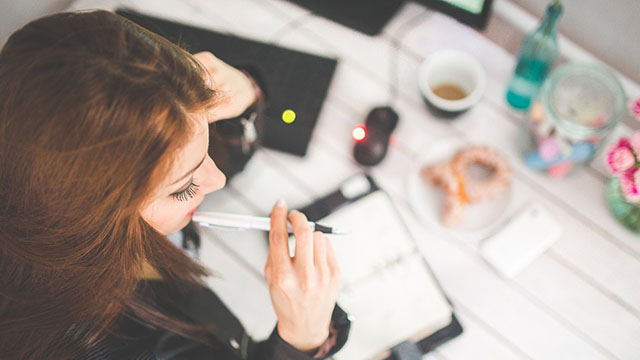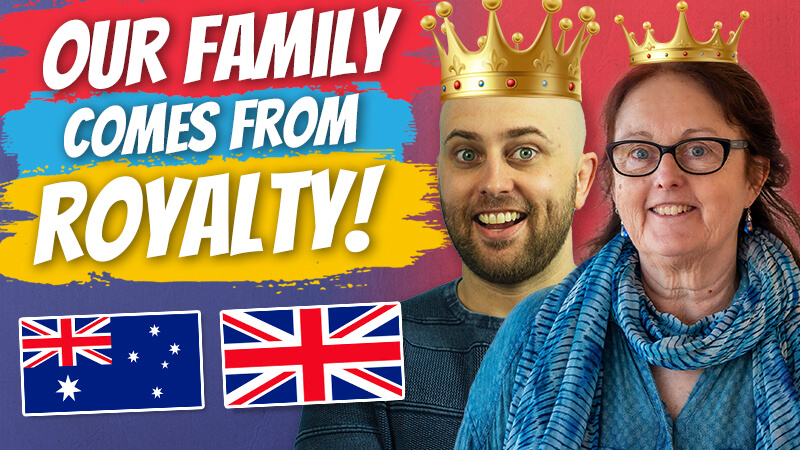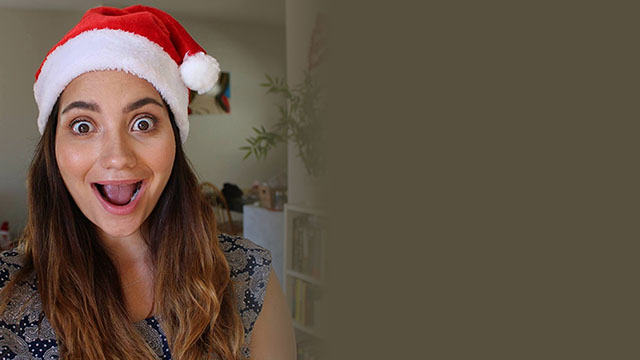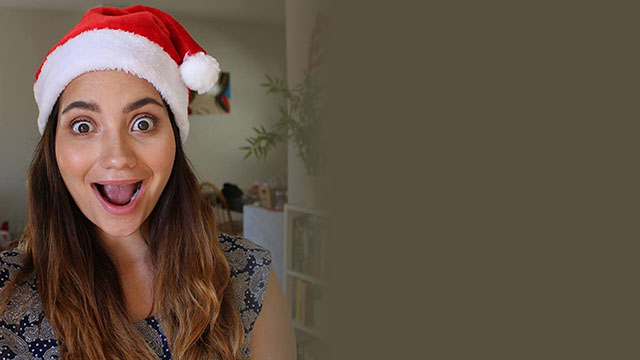AE 508 – IELTS Course: Lesson 2 – Family
Learn advanced English in this IELTS course episode of The Aussie English Podcast where Kel and I show you how to talk about family.
IELTs – Lesson 2: Family
Pete: Alright, so welcome to this episode of Aussie English, guys! This is the first of many episodes, hopefully, to help you guys with IELTS. So, we’re going to hopefully use a lot of different vocabulary, a lot of different expressions and talk about our families in this episode. So, there’s going to be this free video and podcast episode that will go up obviously on the podcast and on YouTube, but then there will also be a breakdown of the different expressions, collocations the more advanced English used in this episode for anyone in the Aussie English classroom. So, remember, guys, you can sign up down below here click on theenglishclassroom.com, go and check it out.
Kel: Before you get into it. So, let’s just get through what the speaking test in on IELTS. So, the speaking test has three parts and the first one they’re going to ask you…. So, you have an examiner in front of you, just talking to you normally as we’re doing now and the first thing they’re going to ask you is to introduce yourself. So, you might have to explain what are you doing in Australia? Where are you from? Things like that, just a small talk and it’s not is no big deal like that’s a normal conversational have with your friends, for example. The second part is about a specific topic like family and family things like we’re going to do today so, they might ask you about I don’t know, a holiday that you really enjoyed with your family, who you love the most in your family, things like that. And the third part is about the same topic but they’re going to ask further questions. For example, if the topic is family, they might ask you to explain how families are structured in your country, for example, or If you’re from a very traditional family or not so just further questions about the same topic and they will be judging your vocabulary, your pronunciation, your fluency and your grammatical range. So just talk as much as you can, show they you have vocabulary, that you know how to use different sentences, different verbs and synonyms and yeah that’s pretty much what I would do…
Pete: So, be as descriptive as possible and go into as much detail as possible and talk for as long as possible. If they say to you who is in your family? Don’t just say me, my dad and my mom.
Kel: And another thing, be relaxed. What happened to me was I was really confident for my test but I didn’t talk as much as I know I could. And you know, at the end I got really nervous because I knew that I would…I can do better, I can do better, but I was just like okay… my mark wasn’t bad, but I know that next maybe next time I’ll do much better because they just want you to talk and communicate as much as you can.
Pete: Exactly. So, do you want to get into it just by before we go through any of this, talking about your family. So, you know, imagine when you’re in one of these ILETS exams and I say Can you introduce yourself and can you tell me about your family?
Kel: Okay so I’m Raquel. I’m from Brazil. Where families are very important I think that’s a similar thing to Australia, right?
Pete: It’s a similar thing everywhere, right?
Kel: I don’t know…but we do have this…. Families are really, really important and most families are quite traditional so, you have the nuclear family, your dad, your, siblings and you also have your extended family very close to you. So, in my case I was living with my grandmother, my aunts and uncles as well as my mum and my sister. My parents got divorced when I was… around six so there was a bit, you know, unusual, different from most families in Brazil. But, yeah, I have a really big family and we don’t we are not in contact with every single person, obviously, but we are a big family. Both sides like, my mum’s family is quite extensive and my Dad’s family is really, really big as well. It’s impossible for me to remember every single person to talk about them because there’s just too many people. And yeah that’s pretty much…
Pete: I’m sure I can relate to that with regards to big families. So, who are you closest to in your family?
Kel: Hmmmm…I’m really close to my sister from my parents. You know, my first… my mum’s first marriage.
Pete: With your father. So, you guys, do you wanna describe that? Like you’ve got two siblings from the same parents…
Kel: And two are the ones from my father’s second marriage., Is it correct?
Pete: Yeah exactly, exactly. And they are half siblings.
Kel: Yeah, half siblings.
Pete: So, you have half sister and half brother.
Kel: Yes. I’m closest to my sister, I would say and also my mum like because we were living together, when my parents got divorced I stayed with my mum so I can say okay we’re kind of close, but to be honest I would just ,you know, mention my sister. She is…. we are very different from each other like she is so much more organized, I’m always talking about her, but yeah my sister is my best friend and my other siblings are really close to me as well. Like my… Gabriella she’s like 19 so, she’s you know starting her life as a young adult, and I kinda feel like Oh my Gosh! So worried so concerned about her.
Pete: Awesome. And what about your grandparents on either side of your family? Did you have a close relationship with your grandparents when growing up?
Kel: It’s funny, because I didn’t meet my father’s dad…. My mum’s dad, I met my father’s dad, my grandpa, but he died a few years a go and and we were not that close anyway, like he was a bit, you know, quiet and he wouldn’t talk much with the kids. So, we didn’t develop any relationship.
Pete: You didn’t have a close relationship.
Kel: Yes, but I didn’t meet my mum’s father, but I’m really, really close to my grandmother. y grandmothers, they’re just very different women, but they are still really, really good people. My mum’s mother is… she raised me, when I think about my upbringing, everything, my values I got from her. She’s a very strict woman, very traditional, quite religious, Catholic. Yeah. So yeah but, you know, that’s her generation and my other grandmother she is quite religious as well, but she’s not as emotional as the other one, like she’s a great reporter who makes sure you eaten, you have everything you need, but she’s not warm and like really affectionate. They’re very different, very different personalities. What about your grandparents, we visited them…
Pete: Well, I can talk about my family, we can switch the roles now where you can be the one asking me questions and I can answer them.
Kel: So yeah, like how does it feel to have your grandparents in their 90s, right? And we visited them the other day and it was mind blowing, just like… they were asking about the internet and things like that, it just got us, both of us, really thinking about how life goes so quickly and I don’t have this sort of relationship with my grandparents. So how is it for you?
Pete: It’s pretty good, I guess before we get into that, though, I can give you a sort of summary of my entire life. So, I grew up with my one sister, I have a full sister. My parents have been married the entire time, obviously, and so I was born in Fern Tree Gully on the other side of Melbourne here, in Victoria in Australia, and grew up there for nine years, first nine years of my life and then we moved down here to where we are now, which is Ocean Grove about two hours away from where I grew up in Fern Tree Gully and so yeah I have my parents, they were both really loving, my dad was pretty… he was probably the stricter of the two. So Mum was always really loving and caring and would let me get away with murder and she would let me do whatever I wanted whereas dad was a lot stricter and… he would let you, you know…he would have you on a tight leash, I think is a good way of explaining it where you could do what you wante, but within limits and within control. And so I think it was a pretty fun and enjoyable upbringing for sure, especially we were talking the other day about living in Ocean Grove and what it was like and how it differed between how your upbringing Brazil and mine here and we used to have free roam of the streets. When I was probably…. maybe 12 years old my parents would let me go out by myself and hang out with my friends in the street and Kel was like How did you know when to come home?
Kel: That’s so different from me. I couldn’t do that. Even…. like being a teenager, I remember I would go to school, come back home and that was it, like there was no okay you’re allowed to go out for a party or something. Not just because it might be dangerous, but like my family was really strict. We didn’t have the freedom he had for example.
Pete: No boys, no drugs, no alcohol, no cigarettes, no. Although I had most of those, but the boys and girls wasn’t as specified as the drugs and cigarettes.
Kel: My grandmother was the kind of person… she is. thank God she is alive… but she would say you should not go to your friend’s house because, you know, their parents might get annoyed at you and you don’t want them to be talking about you or everyone’s going to know what you are, you know, an annoying kid or something, so it was like, ok….
Pete: But you were, right?
Kel: I was, but anyway, that was pretty much like very different like I remember you saying that yeah I would just go back home once the lights were…
Pete: Exactly, so they would let me out, I’d play skateboard, ride my bike around and you know fall off that and play ball games. Kicking the ball around, playing soccer, footy and my parents would just say when the street lights come on just come home. And so you knew that they would have an eye outside and be keeping an eye on the street lights and if they came on and I wasn’t home quick enough then they would come and find me and I’d usually be in trouble. So, that was that was pretty good. My upbringing was pretty good here, my sister and I never had a really close relationship.
Kel: Yeah, I was going to ask you about sibling rivalry…
Kel: So compared to you you and your sister have this incredibly strong connection and I think we’ve spoken about it where I think potentially your parents divorce led you to being incredibly close, which may have happened in my case, had that had happened in my family, but because it didn’t happen my sister and I were always competing for attention, resources, probably praise, you know, I got this on a test, would did he get? blah blah blah. And so we… until more recently, like probably more recent years, maybe the last five years, me and my sister, my sister and I did not have a close relationship and I would have… I would probably say we really disliked each other, you know, in that teen years.
Kel: That’s so funny, because she’s so lovely,..
Pete: She is now.
Kel: She is so lovely. I’m always like what are you talking about? She’s amazing!
Pete: She is lovely now and that’s why we’re close, we’re close now, we see each other.
Kel: It’s funny how things turn up differently. Like, for me having my parents divorce is such a young age… I didn’t have the emotional security from them, you know, when I was little and I had to… I had to have someone so my sister and I we became really close and best friends, we would take care of each other, do everything together. Of course, you had fights, you know, every every now and then, but overall it was just like love we’ve always been friends and it’s…that’s so interesting.
Pete: But back on the grandparents. So, I never knew my dad’s father. He died from lung cancer from smoking before I was born. I knew my grandmother, his mother, but she died from brain cancer when I was 12, from smoking as well. They smoked a lot and that obviously led to these cancers. So that was pretty sad. Growing up I remember that was the first big death in the family was my grandmother passing away and at the time it was really kind of upsetting because I was very close with her, but not close with my mother’s parents very much because they were a lot different. My mother’s parents were very strict kind of upper class, proper people, who said grace before dinner. They were religious too and very rigid, very straight, very organised and I don’t know, proper, proper is probably the best, whereas my grandmother having her husband who had passed away maybe a decade before, she was always like….We would go to her house and she would do everything for us and we’d be all about us. It would be like What do you want to do? Do you want to play games? Do you want to go to the beach? Do you want to do this? Whereas going to my mother’s parents house it would always be like this is what we’re doing, this is what we’re going to be eating, where we’re going and it was more about what they wanted to do fitting us in. But in more recent years, having obviously grown up a bit myself, I’ve gotten to know my grandparents a lot more and we have a close relationship now, my mother’s parents who are both still alive and I think 85 and 87, although they tend to not talk about their age very often.
Kel: It’s funny like we went there and I felt this generation gap, you know, how… you know, just different things are and the world changed around you, you’re just getting older and talking to them just like… what about this person? We don’t know who those people were…
Pete: Their parents, they were talking about my great grandparents.
Kel: So, really, really interesting.
Pete: Exactly, Awesome. And I think what else should we chat about with regards to discussing family? So that’s probably a good start to how the discussion would go. It may not go as long as that.
Kel: No, probably not, but make…keep in mind you have to talk more than examiner. So, if you’re talking, that’s awseomw, if the other person needs to keep pushing you, that’s not a good sign. Something that might be interesting to mention, some people are only child, right?
Pete: Children.
Kel: Children, see?!
Kel: And they might have a completely different structure from, you know, our families like I have siblings, you have a sister if they ask like talk about your siblings or whatever just say yeah, I’m an only child and that’s, you know, my parents decided not to have another baby so, things like that. It might change depending on your family structure.
Pete: But I think it’s a good thing to think about too is just when they obviously you to start talking about your family, pick one person to begin with them and then just go through the people, you know. So, obviously you’ll be starting with yourself, and you’ll introduce yourself, you can talk about your history, where you’re from and then you can just go ok my father blah, my mother blah, my siblings, my brother, my sister, my half sister, my half brother, you know, you can talk about those relationships and then go on to grandparents. I guess preparing you could list all the people you could potentially talk about and I’m sure the examiners won’t give you enough time to go through all of them in your family, right? So as long as you switch between them and then you’re going to end up with this chain of thoughts that ends up in any sort of discussion.
Kel: And they might be really specific as well. So, we were saying talk about a family but they might ask if something really like tell me more about your mother, or what values you get from your mother? Things like that so that that’s when you have to be quite specific and just talk about this one person because if you keep changing they might think, oh you’re not fully… fully responding to the question.
Pete: Brilliant. Alright, guys, we might finish up here for the free content. So, this is going to be on the podcast, obviously and it’s going to be on the YouTube channel. Make sure that if you would like all of the bonus content for this episode today where we’re going to break down more of these expressions, collocations and hopefully give you more tools for describing your family and doing better on IELTS, make sure that you go to theaussieenglishclassroom.com sign up. The link will be below. See you there.
Here's what you get when you sign up!
- Read while you listen using the Premium Podcast player.
- Understand every word in every episode.
- Download all PDF transcripts and MP3s for 600+ episodes.
- Get access to bonus member-only episodes.













Responses